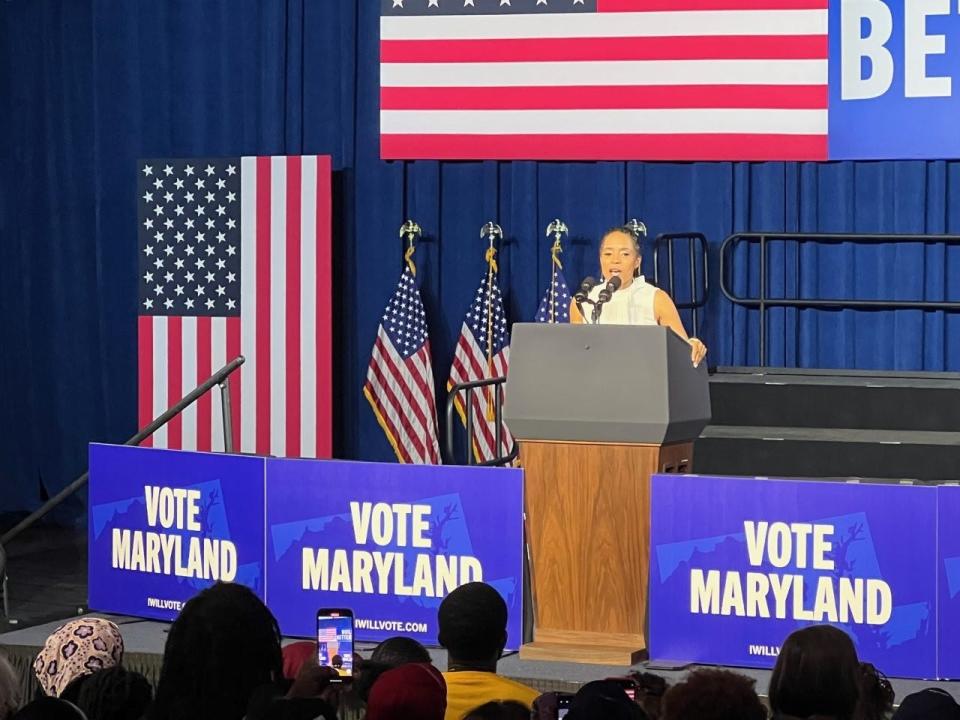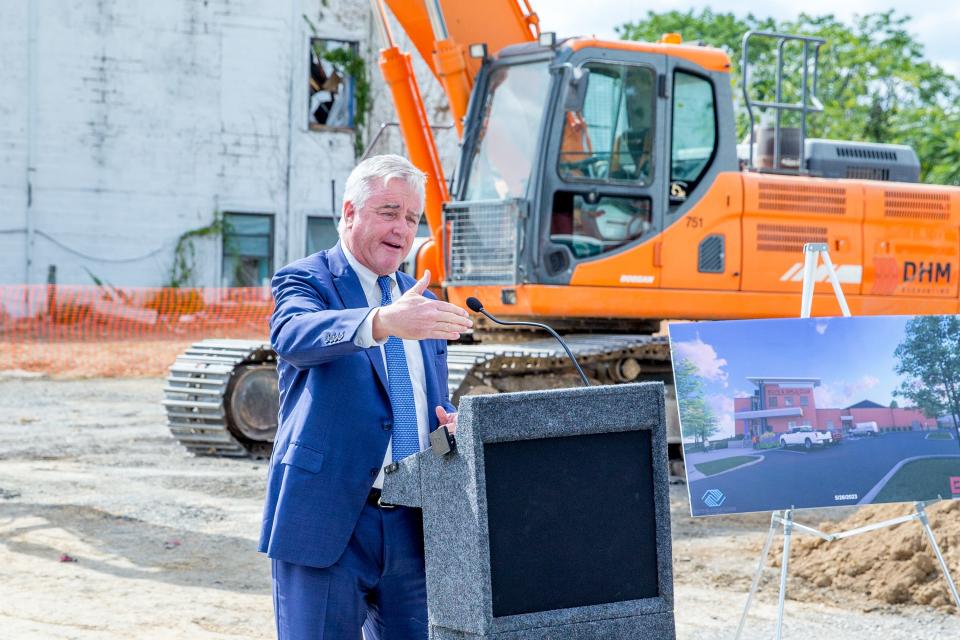Trone leads fundraising in US Senate race in Maryland, but trails in individual donations
- Oops!Something went wrong.Please try again later.
WASHINGTON — U.S. Senate hopeful Angela Alsobrooks has gathered almost 15 times more individual contributions from supporters than her Democratic opponent U.S. Rep. David Trone, D-6th.
Trone, who has represented Maryland’s 6th District since 2019, is the top fundraiser in the race to represent Maryland in the Senate, having raised almost $10 million, according to data reported to the Federal Election Commission. But $9.8 million, the bulk of his campaign’s money, comes from his personal funds, the FEC data shows.
Alsobrooks, who was elected Prince George’s County executive in 2018, is second to Trone in overall fundraising, having garnered about $3.3 million in funding, according to FEC data.
But she has far outpaced Trone in gathering support from individual donors. Approximately $3.1 million of Alsobrooks’ funding comes from individual donors.

Alsobrooks' campaign collects $1.7 million in first seven weeks of race
According to Gina Ford, communications director for Alsobrooks’ campaign, the candidate broke statewide fundraising records by taking in $1.7 million in the first seven weeks of the race and an additional $1.5 million from July to the end of September.
“She … continues to spread her people-first message throughout the state, meeting voters where they are,” Ford said in an email to Capital News Service. “Angela remains focused on the everyday kitchen table issues that Marylanders are concerned about.”
Of the itemized individual contributions that Alsobrooks’ campaign reported, about 34% are from Maryland donors, 9.6% are from Washington, D.C.-based donors, and about 44% of the contributions were donated through ActBlue, a Democratic fundraising platform based in Massachusetts.
Alsobrooks has not relied on any loans or personal funds, according to FEC data.
Trone has $9.8 million, but only 2% is from individual donors
Trone, on the other hand, has only received about $205,220 from individual donors.
The trend is not unusual for the businessman-turned-congressman, who holds the record for the largest self-funded campaign for a House seat in history.
In 2016, during an unsuccessful campaign to represent Maryland’s 8th District in the U.S. House, Trone spent almost $13 million of his own funds. And in 2018, Trone spent about $12 million of his personal funds on his campaign to win the Democratic nomination for Maryland’s 6th District.

Nathaniel Philp, the press secretary for Trone’s campaign, said the three-term congressman’s inclination to self-fund his campaigns comes from a desire to refuse money from political action committees, lobbyists or corporations.
“He’s the leading candidate in this race because he only answers the calls of the people of Maryland, and he consistently puts his money where his values are,” Philp told CNS. “We have the resources to share David’s message with every voter statewide, and we’ve built a winning campaign team to make that happen. "
Trone is about on par with Alsobrooks in terms of where donations to his campaign are coming from.
Of itemized individual contributions to Trone’s campaign reported to the FEC, 31% are from Maryland and 10.9% are from Washington, D.C. Another 37% of donations were made through ActBlue.
Several other contributions to Trone’s campaign were also made through political action committee platforms, including those of the American Israel Public Affairs Committee and Swing Left.
Candidates will report any additional fundraising between the start of September and the end of the year on Jan. 31, when fourth-quarter reports are due to the FEC.
Both Democratic contenders have received high-profile support across the state.
Since the race for the Senate seat launched in May, when Sen. Ben Cardin, D-Maryland, announced plans to retire, Trone has received an endorsement from the state teacher’s union, the Maryland State Education Association. Rep. Dutch Ruppersberger, D-Maryland, also endorsed Trone.
Alsobrooks earned endorsements from Maryland Gov. Wes Moore, Sen. Chris Van Hollen, D-Maryland, and other state and national leaders.
What are Trone and Alsobrooks spending their campaign money on?
Trone has outspent Alsobrooks by more than eight times, disbursing $9.7 million so far in the race, according to the FEC reports. Alsobrooks has spent $1.2 million.
The candidates’ spending habits differ, per FEC data. Payroll and consulting-related expenses have been common for both Trone and Alsobrooks so far — but for Alsobrooks, they’re her top categories. Trone has spent the most on cable television expenses and on digital and media purchases.
Alsobrooks has spent about $351,300 on payroll, the biggest item in her campaign’s spending.
Trone has spent about $2.9 million on digital and media purchases combined. His campaign’s three largest expenditures have gone to Canal Partners Media, a media buying company that has been involved in multiple presidential campaigns.
What other Democrats have officially filed for the Senate race?
Neither Trone nor Alsobrooks officially have filed for candidacy yet, according to the Maryland Board of Elections, but five other Democratic candidates have filed for the Senate seat.
The field comprises businessman Marcellus Crews of Upper Marlboro, Army veteran Juan Dominguez of Annapolis, writer Bryan Frydenborg of Silver Spring, Air Force veteran Steven Henry Seuferer of Montgomery Village and unsuccessful 2022 U.S. Senate candidate Andrew Jaye Wildman of Westminster.
Jerome Segal, the founder of the Bread and Roses Party and who unsuccessfully ran for the Senate in 2018, president in 2020 and Maryland governor in 2022, also announced his candidacy for the Democratic primary but has not filed, according to the elections board listing.
Segal has raised about $1.69 million and spent about $1.7 million, making him the only Democrat in the race to have spent more than he has raised.
Dominguez, Segal and other Democratic candidates are unlikely to win in what several analysts have deemed a two-way contest between Trone and Alsobrooks.
What Republicans have filed for the Maryland U.S. Senate race?
Republicans vying for the Senate seat have lagged in fundraising.
Former state Del. Robin Ficker — who has not officially filed for candidacy, according to the state elections board — has raised $209,601, and registered nurse Lorie R. Friend has raised $626.
The Republican candidates’ spending also pales in comparison to their Democratic counterparts. Ficker has spent $207,932. Friend has spent $3,220 — more than she has raised.
Army veteran Ray Bly of Jessup and retired Air Force Brig. Gen. John Teichert of Crofton have joined Friend in filing for candidacy, but have not reported fundraising or spending records to the FEC.
Maryland is considered solidly Democratic and has not had a Republican senator since the 1980s.
This article originally appeared on The Herald-Mail: Trone tops Alsobrooks in fundraising, but not in individual donors

